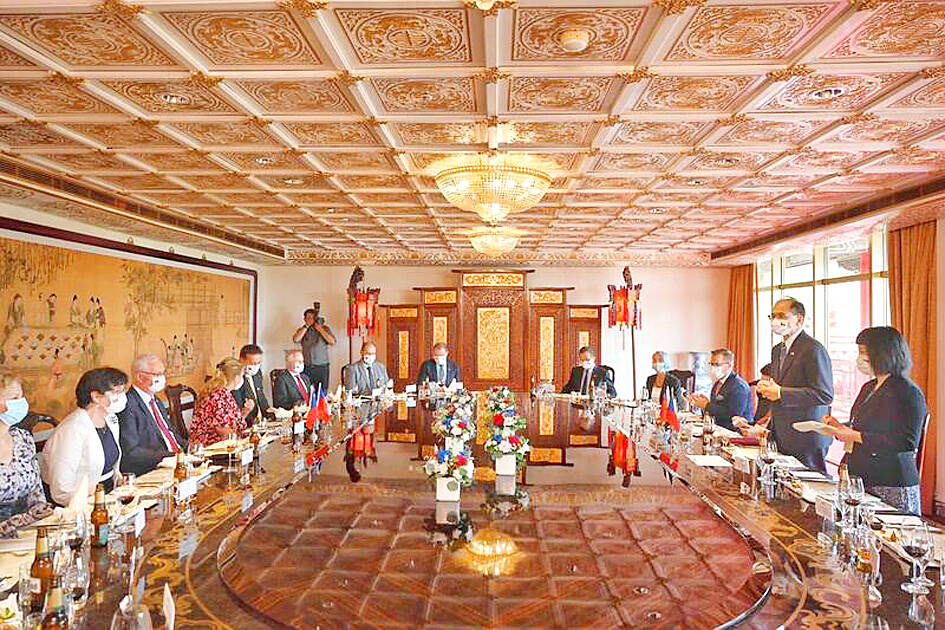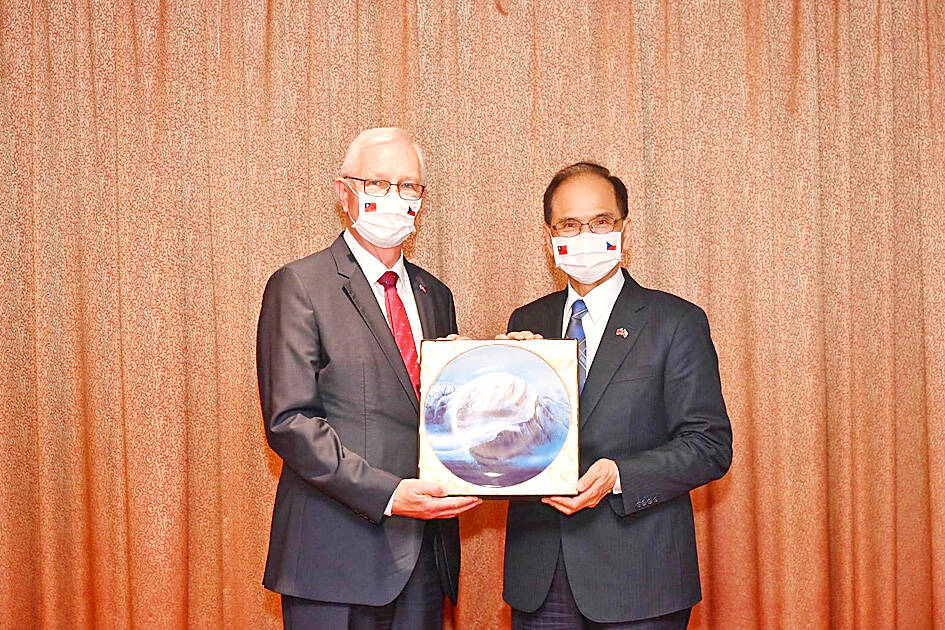The Czech Republic’s commitment to democracy and defense of Ukraine are deserving of admiration, Legislative Speaker You Si-kun (游錫堃) said yesterday while receiving a delegation led by Czech Senator Jiri Drahos in Taipei.
Drahos, who chairs the Czech Senate’s Committee on Education, Science, Culture, Human Rights and Petitions, and 12 other representatives arrived in Taiwan on Sunday for a six-day visit.
Addressing a reception for the delegation at the Grand Hotel yesterday afternoon, You opened by thanking the Czech s for welcoming him and other Taiwanese lawmakers when they visited the European nation in July.

Photo courtesy of the Legislative Yuan
He also praised the Czech Republic as a democratic leader in the region, whose peaceful 1989 Velvet Revolution instigated a wave of democratization across central and eastern Europe.
The late Czech president Vaclav Havel — the first to be elected democratically after the fall of communism in the nation — had the foresight to recognize that the totalitarian nature of communism is unsustainable, You said.
Yet over the past few years, democracy has been losing ground, he said, pointing to Chinese and Russian expansionism, and military rule in Afghanistan and Myanmar.

Photo courtesy of the Legislative Yuan
The Czech Republic ranks 10th in the world in terms of monetary aid to Ukraine — seventh as a percentage of GDP — and sixth in terms of military aid, You said, citing data from Germany’s Kiel Institute for the World Economy.
The nation’s defense of Ukraine in keeping with Havel’s spirit is worthy of admiration, he added.
In his address, Drahos said that although he only arrived the day before, it already feels like home.
The Czech Republic will continue to push for Taiwan’s involvement in international organizations such as the WHO and International Civil Aviation Organization, he said.
Drahos also expressed the hope of establishing direct flights between the two nations to make travel more convenient.
The delegation also includes Czech Academy of Sciences president Eva Zazimalova; Michal Lukes, general director of the National Museum in Prague; Roman Hvezda, director of the ELI Beamlines facility, an international laser research center; and officials from the fields of education, science and technology, as well as experts in epidemic prevention and information security.
Drahos had originally planned to visit Taiwan in October 2020, but postponed the trip due to the COVID-19 pandemic.
Additional reporting by CNA

AIR SUPPORT: The Ministry of National Defense thanked the US for the delivery, adding that it was an indicator of the White House’s commitment to the Taiwan Relations Act Deputy Minister of National Defense Po Horng-huei (柏鴻輝) and Representative to the US Alexander Yui on Friday attended a delivery ceremony for the first of Taiwan’s long-awaited 66 F-16C/D Block 70 jets at a Lockheed Martin Corp factory in Greenville, South Carolina. “We are so proud to be the global home of the F-16 and to support Taiwan’s air defense capabilities,” US Representative William Timmons wrote on X, alongside a photograph of Taiwanese and US officials at the event. The F-16C/D Block 70 jets Taiwan ordered have the same capabilities as aircraft that had been upgraded to F-16Vs. The batch of Lockheed Martin

GRIDLOCK: The National Fire Agency’s Special Search and Rescue team is on standby to travel to the countries to help out with the rescue effort A powerful earthquake rocked Myanmar and neighboring Thailand yesterday, killing at least three people in Bangkok and burying dozens when a high-rise building under construction collapsed. Footage shared on social media from Myanmar’s second-largest city showed widespread destruction, raising fears that many were trapped under the rubble or killed. The magnitude 7.7 earthquake, with an epicenter near Mandalay in Myanmar, struck at midday and was followed by a strong magnitude 6.4 aftershock. The extent of death, injury and destruction — especially in Myanmar, which is embroiled in a civil war and where information is tightly controlled at the best of times —

China's military today said it began joint army, navy and rocket force exercises around Taiwan to "serve as a stern warning and powerful deterrent against Taiwanese independence," calling President William Lai (賴清德) a "parasite." The exercises come after Lai called Beijing a "foreign hostile force" last month. More than 10 Chinese military ships approached close to Taiwan's 24 nautical mile (44.4km) contiguous zone this morning and Taiwan sent its own warships to respond, two senior Taiwanese officials said. Taiwan has not yet detected any live fire by the Chinese military so far, one of the officials said. The drills took place after US Secretary

THUGGISH BEHAVIOR: Encouraging people to report independence supporters is another intimidation tactic that threatens cross-strait peace, the state department said China setting up an online system for reporting “Taiwanese independence” advocates is an “irresponsible and reprehensible” act, a US government spokesperson said on Friday. “China’s call for private individuals to report on alleged ‘persecution or suppression’ by supposed ‘Taiwan independence henchmen and accomplices’ is irresponsible and reprehensible,” an unnamed US Department of State spokesperson told the Central News Agency in an e-mail. The move is part of Beijing’s “intimidation campaign” against Taiwan and its supporters, and is “threatening free speech around the world, destabilizing the Indo-Pacific region, and deliberately eroding the cross-strait status quo,” the spokesperson said. The Chinese Communist Party’s “threats